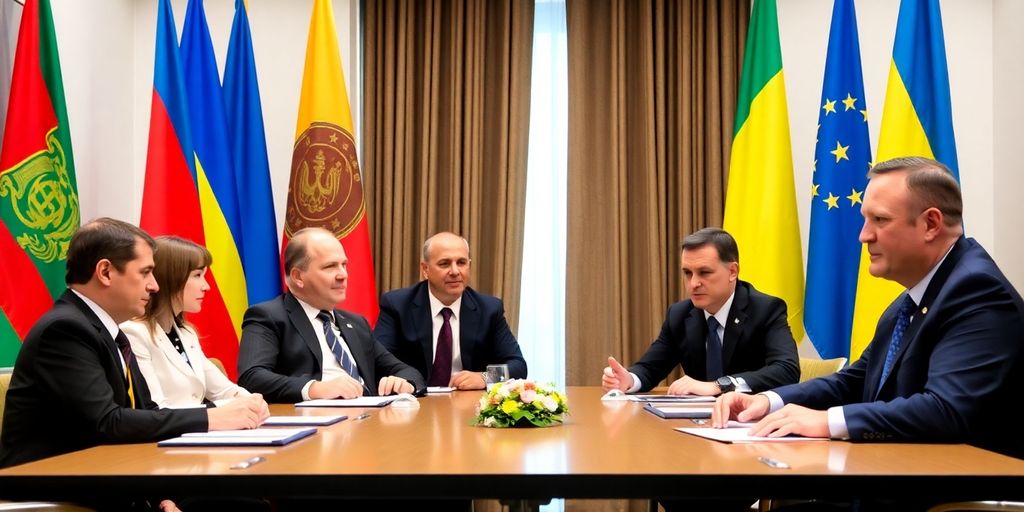Bulgaria is poised to sign a significant security cooperation agreement with Ukraine on December 19, 2024, during the European Council meeting. This agreement, which has been a topic of discussion in Bulgarian political circles, aims to bolster military support and training for Ukraine amidst ongoing tensions in the region.
Key Takeaways
- The agreement will be signed by Bulgarian caretaker Prime Minister Dimitar Glavchev and Ukrainian President Volodymyr Zelenskyy.
- It includes a commitment from Bulgaria to provide military aid and training for the next ten years.
- The agreement has faced opposition from some political factions within Bulgaria.
Background of the Agreement
The draft agreement was submitted to the Bulgarian National Assembly earlier this week, following approval from the caretaker cabinet on October 2. The updated version of the agreement emphasizes Bulgaria’s commitment to support Ukraine, particularly in light of the ongoing conflict with Russia.
During discussions leading up to the signing, Bulgarian officials reiterated their support for Ukraine’s sovereignty and territorial integrity. Caretaker Defence Minister Atanas Zapryanov stated, "Bulgaria firmly stands behind the sovereignty and territorial integrity of Ukraine," highlighting the importance of this agreement in the context of regional security.
Political Reactions
The agreement has sparked a mix of support and opposition within Bulgaria’s political landscape. While many lawmakers, including those from the We Continue the Change – Democratic Bulgaria party, have expressed their backing, others, particularly from the pro-Kremlin Vazrazhdane party, have voiced strong objections.
- Supporters argue that the agreement aligns with Bulgaria’s long-standing policy of supporting Ukraine and is essential for regional stability.
- Opponents claim that the agreement could compromise Bulgaria’s security interests and have called for its cancellation, labeling it as unequal and potentially harmful.
Parliamentary Approval Required
Despite the planned signing, Prime Minister Glavchev has indicated that the agreement requires parliamentary approval before it can be finalized. He emphasized the need for a clear mandate from the National Assembly, stating, "I will sign the agreement if the National Assembly authorizes it during my caretaker mandate."
The delay in signing has led to heated debates in the National Assembly, with some factions accusing the Speaker of the House of obstructing the process. The political climate remains tense as various parties navigate their positions on this critical issue.
Implications for Bulgaria and Ukraine
The signing of this agreement is expected to have significant implications for both Bulgaria and Ukraine. For Bulgaria, it represents a commitment to NATO policies and a step towards deeper integration with European defense strategies. For Ukraine, the agreement signifies continued support from a neighboring EU member state, which is crucial as it faces ongoing military challenges.
As the situation develops, all eyes will be on the Bulgarian National Assembly to see if they will grant the necessary approval for this pivotal agreement, which could reshape the security landscape in Eastern Europe for years to come.
Sources
- Bulgaria scheduled to sign security cooperation agreement with Ukraine on December 19 – The Sofia Globe, The Sofia Globe.
- Rumen Radev: Political Dialogue between Bulgaria and North Macedonia Should Be Conducted at All Levels and Can Achieve Results When Built on Mutual Respect and Implementation of the European Consensus of 2022, President.bg.
- BTA :: PM Says There Is No Reason for Bulgaria to Step Back from Position on Skopje’s EU Accession, БТА.
- BTA :: Vazrazhdane Urges Bulgaria Against Signing Agreement on Security Cooperation with Ukraine, БТА.
- Bulgarian PM Delays Signing Ukraine Agreement, Awaits Parliamentary Approval – Novinite.com – Sofia News Agency, Novinite.com.

